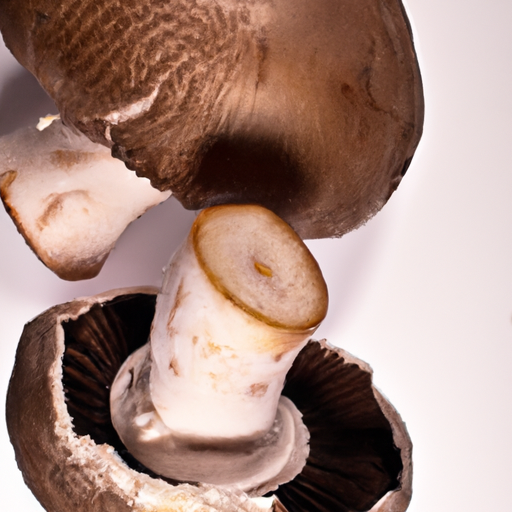In this article, you will learn about the health benefits of mushrooms as a healthy alternative to meat. We will delve into the comparison between mushrooms and meat, discussing the nutritional value and potential advantages of incorporating mushrooms into your diet. Whether you are a vegetarian, vegan, or meat eater looking for healthier options, mushrooms can offer a wide range of benefits for your overall well-being.
When it comes to health benefits, mushrooms have a lot to offer. Compared to meat, mushrooms are low in calories, fat, and cholesterol while being high in essential nutrients such as vitamins, minerals, and antioxidants. They are also a great source of protein, making them an excellent option for those looking to reduce their meat consumption or follow a plant-based diet. Moreover, mushrooms have been linked to various health benefits, such as boosting the immune system, promoting heart health, and improving digestion. By incorporating mushrooms into your meals, you can enjoy a delicious and nutritious alternative to meat while reaping the numerous benefits they have to offer.
Mushrooms: A Healthy Alternative to Meat
Mushrooms have long been recognized for their unique taste and texture, but did you know they also offer a wide range of health benefits? Whether you’re a vegetarian or simply looking to reduce your meat consumption, incorporating mushrooms into your diet can be a great way to boost your overall health and well-being. In this article, we will explore the numerous health benefits of mushrooms and why they can be a healthy alternative to meat.

Nutritional Value of Mushrooms
Mushrooms are not only low in calories but are also packed with essential nutrients. They are an excellent source of vitamins such as riboflavin (B2), niacin (B3), and pantothenic acid (B5). These vitamins play a crucial role in energy production and the maintenance of a healthy nervous system. Mushrooms are also a rich source of minerals such as selenium, copper, and potassium, which are vital for the proper functioning of the body.
Mushrooms as a Source of Protein
One of the main concerns for individuals reducing their meat consumption is ensuring an adequate intake of protein. Mushrooms can be a fantastic alternative protein source, as they contain all nine essential amino acids needed by the body. While mushrooms do not provide as much protein as meat, they can still contribute significantly to your daily protein requirements. Incorporating mushrooms into meals such as stir-fries, salads, or vegetarian burgers can help maintain muscle health and support tissue repair.

Mushrooms as a Source of Fiber and Low in Calories
Mushrooms are an excellent addition to a healthy diet due to their high fiber content and low calorie count. Fiber is essential for maintaining a healthy digestive system, regulating blood sugar levels, and promoting feelings of fullness. With only about 20-40 calories per cup, mushrooms are a guilt-free food that can be enjoyed in generous portions without compromising your calorie intake.
Mushrooms as a Source of Essential Nutrients
In addition to protein, fiber, vitamins, and minerals, mushrooms also contain bioactive compounds that offer unique health benefits. For example, certain species of mushrooms are rich in beta-glucans, a type of soluble fiber known for its immune-boosting properties. Other mushrooms contain compounds with antioxidant and anti-inflammatory effects, which can help reduce the risk of chronic diseases such as heart disease and cancer.
Comparing Mushrooms and Meat
Differences in Nutrient Profiles
While mushrooms offer many health benefits, it’s important to understand the key differences in nutrient composition between mushrooms and meat. Meat is an excellent source of complete protein, providing all essential amino acids needed by the body. It also contains essential nutrients such as iron, zinc, and vitamin B12, which can be more challenging to obtain from vegetarian sources. On the other hand, mushrooms are lower in fat and calories and high in fiber compared to most meats.
Mushrooms as a Meat Substitute
Although mushrooms cannot fully replicate the taste and texture of meat, they can be an excellent substitute in many recipes. Their meaty texture and umami flavor make them a popular choice among vegetarians and meat-eaters alike. Portobello mushrooms, for example, can be grilled and served as a burger patty, providing a delicious and satisfying alternative to a traditional beef burger. Other mushrooms can be used in stir-fries, sauces, and stews, adding depth and flavor to vegetarian meals.
Health Impact of Consuming Mushrooms over Meat
Reducing meat consumption and incorporating more plant-based foods into your diet has been linked to numerous health benefits. High consumption of red and processed meats has been associated with an increased risk of heart disease, certain cancers, and type 2 diabetes. In contrast, a diet rich in fruits, vegetables, and mushrooms has been shown to lower the risk of these chronic diseases and promote overall well-being. By choosing mushrooms over meat, you can improve your cardiovascular health, manage your weight, and support a healthy immune system.
Effect on Environmental Sustainability
In addition to personal health benefits, reducing meat consumption and incorporating mushrooms into your diet can have a positive impact on the environment. The meat industry is a significant contributor to greenhouse gas emissions, deforestation, and water pollution. On the other hand, mushrooms require significantly fewer resources to grow, making them a more sustainable food choice. By opting for mushrooms as a meat alternative, you can help reduce your carbon footprint and contribute to a more environmentally friendly food system.
Economic Considerations of Mushroom Consumption
Mushrooms are not only a healthy and sustainable choice but can also be an economically sound option. Meat tends to be more expensive, especially high-quality cuts, while mushrooms are generally more affordable. Incorporating mushrooms into your meals can help lower your grocery bill while still providing valuable nutrients and flavors. Furthermore, mushrooms are relatively easy to grow, making them a viable option for home gardening and self-sufficiency.
Edible Mushrooms for a Healthy Diet
Types of Edible Mushrooms
There is a wide variety of edible mushrooms available, each with its unique flavor and nutritional profile. Some popular options include:
- Button Mushrooms: These are the most common variety and have a mild flavor that pairs well with a variety of dishes.
- Shiitake Mushrooms: Known for their rich, savory flavor, these mushrooms are a staple in Asian cuisines and are often used in stir-fries and soups.
- Portobello Mushrooms: These large, meaty mushrooms are often used as a meat substitute due to their robust flavor and substantial texture.
- Oyster Mushrooms: With their delicate, slightly sweet taste, oyster mushrooms are a versatile choice that can be used in a variety of dishes, including stir-fries and pasta sauces.
Health Benefits of Specifically Chosen Edible Mushrooms
Each type of edible mushroom offers its own set of health benefits. For example, shiitake mushrooms contain compounds called lentinan and eritadenine, which have been shown to support the immune system and promote heart health. Portobello mushrooms, on the other hand, are an excellent source of vitamins B2 and B3, which are essential for energy production and brain function.
Incorporating Mushrooms into Different Meals
Mushrooms are incredibly versatile and can be incorporated into a wide range of meals. They can be sautéed with garlic and herbs as a flavorful side dish, added to pastas and risottos for extra texture, or used as a topping for pizzas or salads. You can also stuff mushrooms with a variety of fillings, such as cheese, breadcrumbs, or spinach, for an appetizing and nutrient-dense snack.
Cooking Techniques for Enhancing Nutritional Value
To maximize the nutritional value of mushrooms, it’s important to use cooking techniques that preserve their nutrients. Lightly sautéing or steaming mushrooms is a great way to retain their vitamins and minerals while enhancing their flavor. Avoid overcooking mushrooms, as this can lead to nutrient loss. Additionally, pairing mushrooms with a source of vitamin C, such as citrus fruits or peppers, can enhance the absorption of iron, present in mushrooms, by the body.
Conclusion
Incorporating mushrooms into your diet can be a fantastic way to improve your health, reduce meat consumption, and support a more sustainable food system. With their unique nutritional profile, mushrooms offer a range of health benefits, including a good source of protein, fiber, vitamins, minerals, and bioactive compounds. By experimenting with different types of edible mushrooms and incorporating them into a variety of meals, you can enjoy their delicious flavor while boosting your overall well-being. Whether you’re a vegetarian, a health-conscious omnivore, or simply curious about exploring new flavors, mushrooms are a healthy alternative to meat that can benefit both you and the planet.


